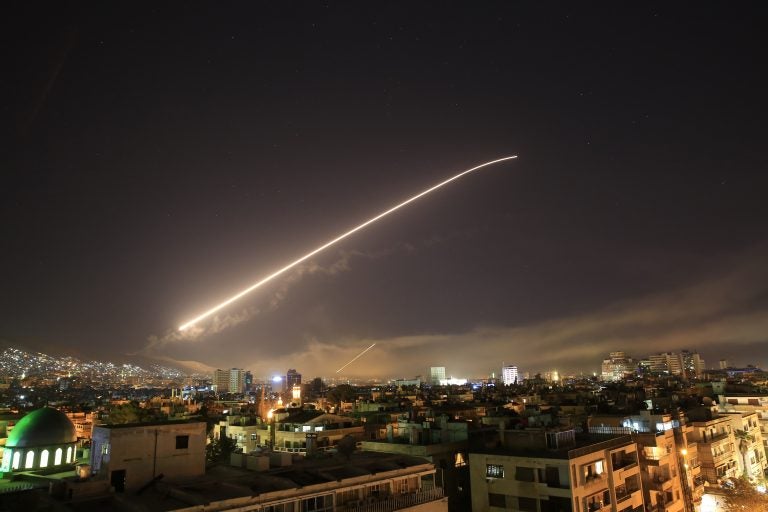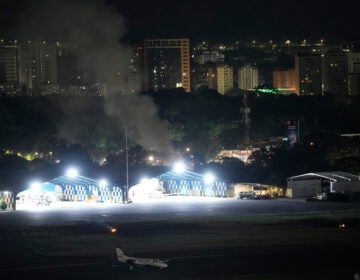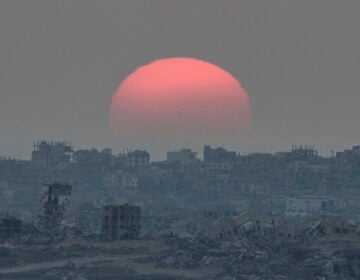Explosions rock Syrian capital as Trump announces strikes
The U.S. president said the U.S. is prepared to "sustain" pressure on Assad.

The Damascus sky lights up missile fire as the U.S. launches an attack on Syria targeting different parts of the capital early Saturday, April 14, 2018. Syria's capital has been rocked by loud explosions that lit up the sky with heavy smoke as U.S. President Donald Trump announced airstrikes in retaliation for the country's alleged use of chemical weapons. (Hassan Ammar/AP Photo)
Loud explosions rocked Syria’s capital and filled the sky with heavy smoke early Saturday after U.S. President Donald Trump announced airstrikes in retaliation for the country’s alleged use of chemical weapons. Syrian television reported that air defenses responded to the attack.
Associated Press reporters saw smoke rising from east Damascus and the sky turned orange. A huge fire could be seen from a distance to the east. Syrian television reported that a scientific research center had been hit.
Syrian media reported that air defenses hit 13 rockets south of Damascus. After the attack ceased and the early morning skies went dark once more, vehicles with loudspeakers roamed the streets of Damascus blaring nationalist songs.
“Good souls will not be humiliated,” Syria’s presidency tweeted after airstrikes began.
Trump announced Friday night that the three allies had launched military strikes to punish President Bashar Assad for the alleged chemical weapons use and to prevent him from doing it again.
The U.S. president said the U.S. is prepared to “sustain” pressure on Assad until he ends what the president called a criminal pattern of killing his own people with internationally banned chemical weapons. It was not immediately clear whether Trump meant the allied military operation would extend beyond an initial nighttime round of missile strikes.
Trump said the joint attack was expected to include barrages of cruise missiles launched from outside Syrian airspace. He described the main aim as establishing “a strong deterrent” against chemical weapons use.
The Syrian government has repeatedly denied any use of banned weapons.
The decision to strike, after days of deliberations, marked Trump’s second order to attack Syria; he authorized a barrage of Tomahawk cruise missiles to hit a single Syrian airfield in April 2017 in retaliation for Assad’s use of sarin gas against civilians.
Trump chastised Syria’s two main allies, Russia and Iran, for their roles in supporting “murderous dictators,” and noted that Russian President Vladimir Putin had guaranteed a 2013 international agreement for Assad to get rid of all of his chemical weapons. He called on Moscow to change course and join the West in seeking a more responsible regime in Damascus.
The allied operation comes a year after the U.S. missile strike that Trump said was meant to deter Assad from further use of chemical weapons. Since that did not work, a more intense attack would aim to degrade his ability to carry out further such attacks, and would try to do this by hitting Syrian aircraft, military depots and chemical facilities, among other things.
The one-off missile strike in April 2017 targeted the airfield from which the Syrian aircraft had launched their gas attack. But the damage was limited, and a defiant Assad returned to episodic use of chlorine and perhaps other chemicals.
Friday’s strikes appear to signal Trump’s willingness to draw the United States more deeply into the Syrian conflict. The participation of British and French forces enables Trump to assert a wider international commitment against the use of chemical weapons, but the multi-pronged attack carries the risk of Russian retaliation.
In his nationwide address, Trump stressed that he has no interest in a longtime fight with Syria.
“America does not seek an indefinite presence in Syria under no circumstances,” he said. “As other nations step up their contributions, we look forward to the day when we can bring our warriors home.”
The U.S. has about 2,000 troops on the ground in Syria as advisers to a makeshift group of anti-Islamic State fighters known as the Syrian Democratic Forces. They are in eastern Syria, far from Damascus. A U.S.-led coalition has been conducting airstrikes in Syria since September 2014 as part of a largely successful effort to break the IS grip on both Syria and Iraq.
WHYY is your source for fact-based, in-depth journalism and information. As a nonprofit organization, we rely on financial support from readers like you. Please give today.




